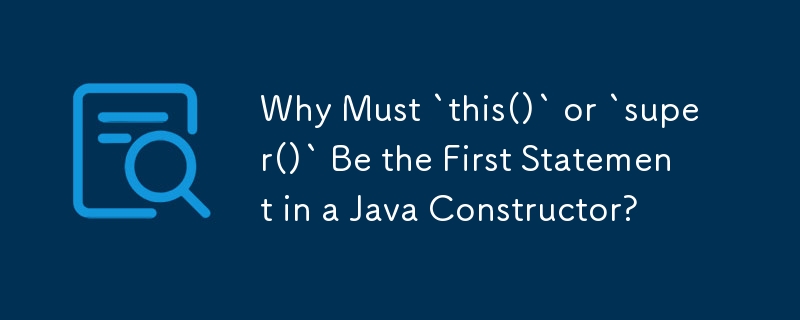

Java mandates that if a constructor calls this() or super(), these calls must be the constructor's first statements. This requirement ensures that:
The parent class's constructor needs to initialize the parent class instance before any processing can happen in the child class. This ensures that methods called in the subclass constructor can rely on the parent class already being correctly set up.
If this or super weren't required to be the first statements, it would be possible to execute methods on the parent class before its constructor has run. For example:
public class MySubClass extends MyClass {
public MySubClass() {
someMethodOnSuper(); // ERROR: super not yet constructed
super(); // This call would be moved to the beginning of the constructor.
}
}In cases where the parent class has a default constructor, the compiler automatically inserts a call to super() as the first statement of the child class's constructor. This is necessary because every Java class inherits from Object, whose constructor must be called first. Enforcing the first-statement requirement ensures consistent constructor execution order:
Object -> Parent -> Child -> ChildOfChild -> SoOnSoForth
By allowing this() or super() to be called only as the first statement, the compiler prevents invalid code like this:
public MySubClass extends MyClass {
public MySubClass() {
int c = a + b;
super(); // COMPILE ERROR
}
}In this example, super() must be the first statement, and the computation of c is not allowed to precede it. However, the functionality can be achieved by rewriting the constructor as follows:
public MySubClass extends MyClass {
public MySubClass() {
super(a + b); // OK
}
}The requirement to place this() and super() as the first statements in a constructor ensures correct execution order, prevents premature method execution, and allows the compiler to handle default constructors automatically. Without this restriction, invalid code could be written, leading to unreliable behavior or runtime errors.
The above is the detailed content of Why Must `this()` or `super()` Be the First Statement in a Java Constructor?. For more information, please follow other related articles on the PHP Chinese website!




